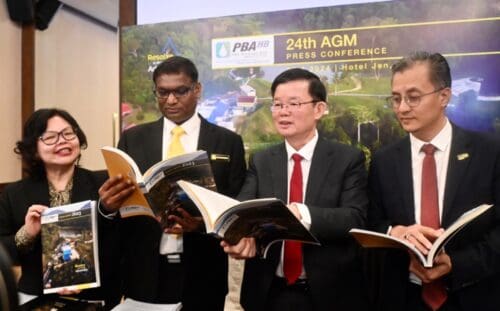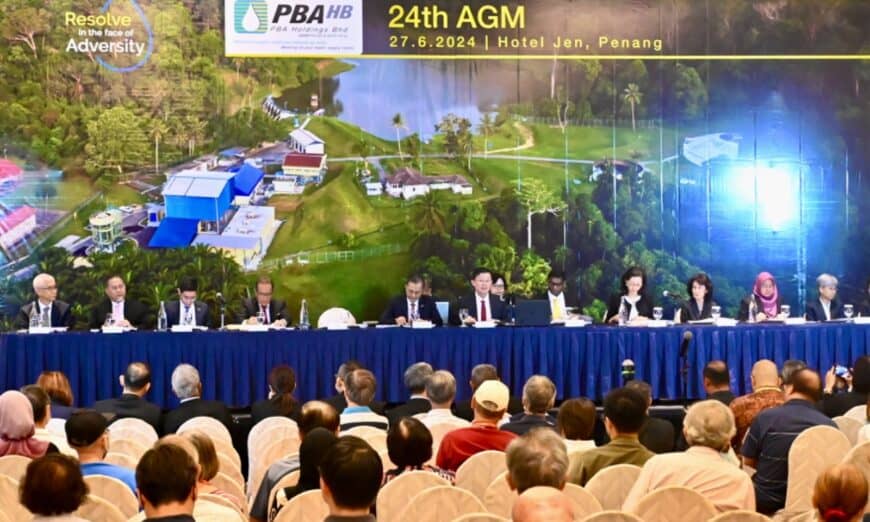A FINAL single-tier dividend of 1.75 sen per share was approved today for the 7,507 shareholders of PBA Holdings Berhad (PBAHB).
The entitlement date is set for July 15, with a total projected payout of RM5.792 million by July 26, according to Chief Minister Chow Kon Yeow.
“With this final dividend, PBAHB shareholders will receive a net single-tier dividend of 3.5 sen per share for 2023,” Chow said in a statement after attending the 24th PBAHB annual general meeting (AGM) at Jen Hotel.
Chow noted that PBAHB’s 2023 net profit of RM34.348 million was lower than the RM77.116 million reported for 2022, primarily due to an RM49 million allocation for deferred tax assets recognised in 2022, which was not available in 2023.
The tax allocation was for ‘deferred tax assets recognised for unutilised reinvestment allowance to the extent that it is probable for recognition’.
However, the profit before tax (PBT) for 2023 was RM68.410 million, a 107.3% increase from RM32.998 million in 2022, driven mainly by a water rate review for non-domestic consumption.
Non-domestic water consumption, which includes business consumers and government organisations in Penang, saw a rate review in 2023.
Chow also highlighted that the Federal Government regulated new domestic water rates for Penang households, effective Feb 1, 2024. These changes also applied to 10 other states and the Federal Territories of Kuala Lumpur, Labuan, and Putrajaya.

He outlined four key rationales for the 2024 Penang domestic water rates:
1. Penang Water Supply Corporation (PBAPP) supplied an average of 877 million litres per day (MLD) of treated water in 2023, the highest in Penang’s history. However, intermittent water issues were reported in some neighbourhoods in south Seberang Perai (SPS) and the southwest district (DBD).
2. PBAPP’s domestic water subsidy amounted to RM116 million in 2023, a level deemed unsustainable. The 2024 rates aim to reduce the subsidy to a more acceptable level while still supporting domestic consumption.
3. Penang’s per capita domestic consumption was 284 litres per capita per day (LCD) in 2023, higher than the national average of 237 LCD in 2022 and Singapore’s 141 LCD in 2023. The new rates are expected to encourage more efficient water use at home, aligning with the Penang2030 vision.
4. The cost of supplying water in Penang has increased by 30% since the last tariff review in 2015, driven by factors such as TNB’s Imbalance Cost Pass-Through (ICPT) in electricity charges and higher energy costs for pumping treated water.
Chow also announced an RM11 million domestic water rebate as a goodwill measure benefitting the majority of PBAPP’s customers.
The rebate will exempt domestic consumers from being billed for the first 10,000 litres of consumption in three bi-monthly water bills between July 1 and Dec 31 this year, resulting in total savings of RM18.60 per consumer and a projected revenue impact of RM11 million for PBAPP.
“This ‘family-friendly’ gesture is intended to provide Penang households with a ‘soft landing’ regarding the 2024 Penang domestic water rates,” Chow said.
He emphasised that PBAHB and the PBAPP are government-linked entities, with the State Secretary Penang holding a 55% majority share.
The additional RM75 million (instead of RM86 million) in projected revenue for PBAPP in 2024, adjusted for the rebate, will primarily fund Water Contingency Plan 2030 (WCP 2030) projects to increase water supply, address water issues, and mitigate supply risks related to Sungai Muda and climate change.
Earlier, PBAHB’s Board of Directors directed PBAPP to ‘move forward and not slide backwards’ to meet Penang’s water demand through 2030.
“With water demand increasing, the development of additional water supply infrastructure in Penang cannot be delayed.
“Failing to progress will result in water shortages affecting both residents and businesses in Penang.
“In February 2024, Penang’s water consumption reached a record high of 927 MLD, and projections indicate that by 2030, the demand will reach 1,532 MLD. This growth reflects Penang’s strong recovery following the Covid-19 pandemic lockdowns,” Chow said.
He noted that the increased water consumption is driven by growing demand within the state, not by PBAPP.
“Beginning this year, water rates have been revised to finance PBAPP’s plans to enhance water supply and address Penang’s water risks.
“PBAPP must now focus on completing its WCP 2030 projects and other strategic initiatives on time.
The WCP 2030 aims to:
1. Tap into three additional raw water resources in Seberang Perai (the expanded Mengkuang Dam, Sungai Kerian, and Sungai Perai).
2. Increase water treatment capacity in Penang by 602 MLD.
3. Boost treated water pumping capacity to Penang island.
“PBAPP must deliver the required results from 2024 to 2028 to avoid another water shortage in Penang,” he added.
Story by Christopher Tan
Pix by Law Suun Ting

